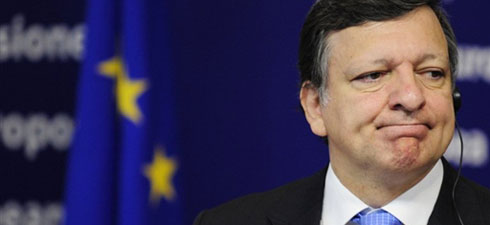On 16 September, the European Parliament is set to vote on the nomination of José Manuel Barroso to the post of President of the European Commission. Barring an upset, the Portuguese politician, who secured the support of the leaders and governments of Europe's member states in June, should be re-elected for another five-year mandate. "As the Chairman of PASD , the socialists' and democrats' group, Martin Schulz has acknowledged that the decision by Parliament's Conference of Presidents of Political Groups to allow a vote on a second term for the outgoing president to take place at the plenary session was tantamount to a decision to reappoint him," explains Libération journalist Jean Quatremer in his Coulisses de Bruxelles ("Behind the Scenes in Brussels") blog.
Until now, the socialists along with the Green and United Left groups wanted to postpone the vote until after the second Irish referendum on the Lisbon Treaty, which is scheduled for 2 October. With Lisbon ratified and adopted, Barroso would have needed a larger majority in Parliament. However, the vote will not be delayed, because the President has succeeded in securing the support of the various political forces in exchange for a number of commitments.
Promises, promises
"To the socialists who reproach him with neglecting labour legislation, M. Barroso has promised regulations on the detachment of workers moving between countries in the European Union that will combat social dumping, reports Le Monde. "He has also pledged to evaluate the social impact of European legislation, starting with the long-suffering European Working Time Directive," and — as the French daily goes on to report — "liberals who criticized his slow response to the financial crisis, have been mollified with a promise that the outgoing President will support proposals for a single EU financial supervisor."
José Manuel Barroso owes his probable re-election to his "well recognized dialectical agility, which enabled him to hold his own in debates (...) in which MEPs criticized his meek line with member states," claims El País. But his reappointment does not guarantee him unconditional support, and "Barroso will have to make many changes if Brussels' leading institution is to adequately respond to the difficult circumstances that have now beset the EU."
A weakened Commission
For Handelsblatt, "Barroso is paying a high price for a second mandate that he is so eager to obtain." In an attempt to appeal to all parties, he no longer represents any clear political line," and most MEPs now regard him as a lame duck." Handelsblatt further predicts that "once the new treaty comes into force, Barroso will be hemmed in […], and reduced to the role of chief administrator of the wishes" of the 27 member states and the European Parliament. This is the situation that will prevail at time of acute economic crisis, when the Union, which is faced with unprecedented debts and environmental challenges, desperately needs a strong leader. "If the President of the Commission cannot take on this role, the question is, who will?"
Mild mannered and often criticized, José Manuel Barroso is nonetheless the Commission President who is most in tune with the mood of the times, writes Charles Grant in the Guardian. That the hard left "should dislike a man who champions free trade, free movement of people and EU enlargement is predictable," insists Grant — who is the director of the Centre for European Reform, think tank — "but I find it strange that many European federalists, though in principle opposed to protectionism, have joined the Barroso bandwagon. Their gripe is that he has failed to drive forward European integration and to give the kind of top-down leadership that Jacques Delors provided when he was commission president (1985 to 1995)."
A post-Delors era
"We no longer live in the age of Delors, when many governments were both committed to European integration and willing to be led by the commission. In these prosaic times there is no dynamic for a more united Europe, and almost all governments are focused on national interests." In his time as Commissioner, Barroso "has focused on the Lisbon agenda of economic reform — which is about raising Europe's long-term rate of growth — and driven forward the EU's programme to counter climate change, as well as plans to safeguard European energy security."
However Týden argues "that the impact of the economic crisis has reduced projects based on innovation and deregulation to sad caricatures of their former selves." But if he is given a second mandate, the Prague weekly predicts that Barroso will be able to demonstrate "greater firmness and moral conviction." In particular, he will be better able to "resist pressure from Paris and Berlin, because he will no longer need German and French support to achieve his personal goals." In any event, Týden is at pains to point out that much has changed in the programme for the next commissioner's mandate. The goal now is to re-establish prosperity in Europe, and the priority of "market deregulation" has been replaced by a drive for greater "economic coordination" and more efficient "regulation of financial markets."
Was this article useful? If so we are delighted!
It is freely available because we believe that the right to free and independent information is essential for democracy. But this right is not guaranteed forever, and independence comes at a cost. We need your support in order to continue publishing independent, multilingual news for all Europeans.
Discover our subscription offers and their exclusive benefits and become a member of our community now!












